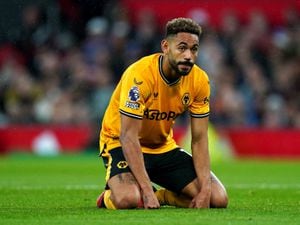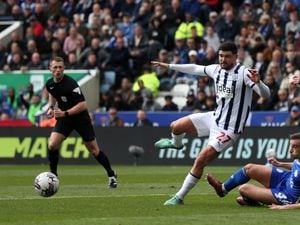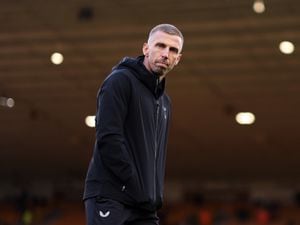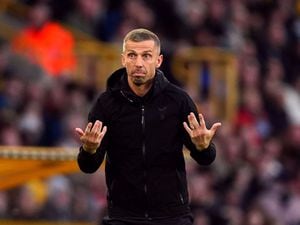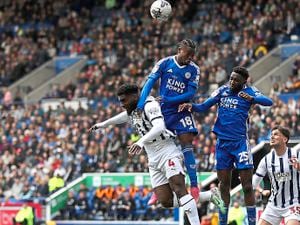The Big Interview: Lee Sharpe and his roots
Most people outside of the West Midlands don't know that Lee Sharpe is a Black Country boy born and bred.
Sharpe rose to prominence as an exciting winger for Manchester United and England and claimed all of the richest prizes in the land,
He'd been snapped up by the Red Devils from Torquay United, with the £200,000 transfer fee a British record for a YTS player at the time.
That's why some assume his roots are in Devon, not the town of Halesowen where the 45-year-old was actually raised. Most of his family are still there.
Dad Leo played non-league himself, supported by mum Gail. Sister Nicola is a teacher at Huntingtree Primary School in Halesowen.
Younger brother John was a promising young player himself with Manchester City, but drifted out of the game and is now a commercial electrician. Football is in their blood.
Eldest child Lee led the way and turned out for the likes of Stourbridge Falcons, Stourport Wednesday and the Halesowen and Dudley district side as a youngster.
A boyhood Villa fan, he dreamed of one day starring for the claret and blues but, instead, signed for arch-rivals Birmingham City aged 15, having attended Hagley Roman Catholic High School.
Sharpe never got the chance to play for his boyhood heroes, in the end, but that was simply because he was never given the opportunity.
He said: "I'm a football fan, when it comes down to it, and the Villa side that won the European Cup were my heroes. I stood in the Holte End, as a kid, cheering on Tony Morley and Gary Shaw.
"I was actually coming back from an England game once and Doug Ellis (then-Villa owner) was sat on the same plane. He told me 'maybe we'll get you down here one day.'
"He never came in from me, if he did I was never made aware of it. I would have been interested, too, whenever it came along."
As a precursor to what would become a topsy-turvy career, he was let go by Blues after a season. Not for the last time, there were fears his potential would go unfulfilled.
The only opportunity in the pipeline with a professional club was 175 miles away at Torquay, then of the bottom-tier in English football.
Under dad's orders, in the end, Sharpe took the plunge expecting a fight on his hands to work his way up the ladder in the muck and nettles of the Fourth Division.
He was quickly knocking of the door of the first-team for 1987-88, where he made 14 appearances scoring three goals. He was still fresh out of school, at 16-years-old.
Word quickly got around of a 'next big thing' playing for the Seagulls and, all of a sudden, United came calling with an acceptable offer. He'd been at Plainmoor for less than a year.
The long road to the top had shortened just like that, with Sharpe recalling: "I was born to an obsessed dad who used to swing me between his legs with a football in the living room.
"By the time I could walk and he realised I was left footed, he had my mum rolling the ball to my right foot to make sure I could kick with both.
"Of all the managers I've ever played under and all of the clubs I've been at, my dad is my only-ever individual coach.
"When I was 15, I went to Birmingham and I thought 'this is where the dream begins.' I was signing autographs in the back of people's textbooks at school.
"Then, at 16, they let me go. That's how I ended up at Torquay, I got myself a trial there and played three games in three days.
"They offered a YTS and I moved hundreds of miles away from home. My mum didn't want me to go, but my dad told me I had to follow my dream.
"I stayed in digs with a lovely Scottish family who had a couple of kids, who I used to babysit. They took me under their wing and treated me as their own. It was a real family atmosphere.
"I had a really good manager there, too, in Cyril Knowles. He wrapped me in cotton wool, like starting me in home games and using me as a substitute away from home.
"I remember playing one game on a Friday night, Hereford at home. I'd not particularly had a great game and I'd been beaten up a bit by their defenders.
"I was laying in bed, about 1.30am, and all of a sudden I hear these footsteps in the corridor. I hear the jingle jangle of keys and in comes the landlady's mate.
"They told me Cyril and the club secretary were downstairs and wanted to see me straightaway. They had just been driven around in a Jaguar by Sir Alex Ferguson.
"He had told them he wasn't leaving until he had shook hands in the morning on a deal to take me to United. I couldn't go until I was 17, so I stopped there until the end of the season.
"I first went up to Manchester on the train and, at the end of the platform, Sir Alex was there himself to meet me. That meant a lot to me."
Living in unfamiliar surroundings already didn't bother Sharpe, at that point, and the switch Old Trafford was the big break he'd been waiting for.
As would prove to his cost later on, he embraced city life and the prospect of starring for one of the biggest clubs in the land. Team-mate and captain Bryan Robson would become his hero.
It wasn't the so-decorated United we know of today, or the Sir Alex who became the most-successful British manager ever. That was all in the pipeline.
Sharpe made his debut in September 1988, as a substitute at home to West Ham, with his first experience of top-flight bullying coming against Tottenham Hotspur soon after in that season.
The left wing spot opened up to the tune of 30 appearances during the 1988-89 campaign, as Ferguson struggled to decide on what was best for the berth.
Jesper Olsen was sold to French side Bordeaux for £400,000 in the November, with Ralph Milne proving an inadequate replacement after a £170,000 move from Bristol City.
Ferguson went out and signed Danny Wallace from Southampton for £1.2million in September 1989, believing Sharpe still wasn't ready. Paul Ince joined from West Ham in the same month.
It wasn't until after the turn of the decade that Sharpe ousted Wallace and made the position his own, which was to coincide with the start of what would become the glory years for United.
Cornerstones were coming into place with Peter Schmeichel, Denis Irwin, Steve Bruce, Gary Pallister, Paul Ince, Brian McClair and Eric Cantona arriving, plus the emergence of Ryan Giggs.
Giggs' fellow 'Class of 1992' prospects would make competition for places even harder as they progressed, with Gary Neville and Nicky Butt the first to debut.
Sharpe said: "It took me a little while to properly settle in and find my feet. It wasn't until the early 1990s that I really found my form and we started to become successful.
"I remember getting in the starting line-up when I was 17, I played left-back against Spurs and Paul Stewart was in central midfield for them.
"He came in late and put his studs straight down the back of my Achilles, when all I was doing was rolling the ball back to our goalkeeper.
"About 10 minutes later, the ball runs into midfield with Stewart going for it and in goes Bryan Robson. Stewart went down like he'd been shot and Robson winks at me.
"A lot of people ask me about the best player I've played with and I've always told them it was Robson. The man was an absolute genius on the pitch.
"As a captain, he was our go-to man if we had a problem with anything. No one spoke to the manager, it was all Robson. He looked after all of us.
"We were allowed to drink, as long as he'd cleared it with the gaffer, and we'd all go to the pub by the training ground.
"You got fined by Robson if you didn't turn up. There would be about 30 of us, first-team and reserves, and the rounds would be quite funny.
"You'd have pints for the old boys, bottles of beer for the young whipper snappers and a large Malibu and pineapple for Gary Pallister!
"There would be a bottle of champagne at the end of the bar for Eric Cantona - and a small glass of coke next to it for Gary Neville. Bless him."
Sharpe probably won't be remembered as one of the United greats, but he did have a goal or two in him. Or a hat-trick, like against Arsenal at Highbury.
That night, on 28 November 1990, in a League Cup fourth round tie, he was the star man in a United shirt, as the Gunners were humbled on their own turf.
But it was the tidy leveller in a 2-2 Champions League draw at home to Barcelona on 19 October 1994 that meant the most to him. It preserved United's then-unbeaten home record to Barca.
He said: "It was a back-heel, I just flicked it in but it's my favourite goal, as that was the equaliser and we'd never lost at home to them.
"My favourite game has to be the hat-trick at Arsenal, they pretty much had the England defence and we scored six in one night. It was crazy."
He was part of a United side that claimed a League Cup, two FA Cups, three titles after the Premier League began and the now-defunct European Cup Winners Cup in eight years.
While not a mainstay, he also represented England eight times, the same amount as he had at Under-21. He was also capped once at B level.
Two footed, Sharpe had switched to the right rather than fight for a place with, arguably, the best left winger of his generation in Giggs.
He and the young Giggs relished being young stars, on and off the pitch. The Welsh legend eventually knuckled down, while 'Sharpey' did not.
And he would find out himself Ferguson had no problem with phasing out big names, as he built the teams that would secure his legacy.
First Robson left to join Middlesbrough as player-manager after 15 years with the club in 1994, with the manager so unconvinced in Ince's ability to lead he sold him to Inter Milan a year later.
The United boss had his choice waiting in the wings, though. He'd bought Roy Keane for £3.75m the summer before from Nottingham Forest and told him to wait for his chance.
Sharpe said: "We'd had a couple of contenders to Robson's throne come in, the first being Paul Ince. He was a proper cockney wide boy.
"He called himself 'the guvnor' and had it everywhere from his boots to his shin pads to the registration plate on his car.
"The other one was Roy Keane and he was a different breed. He genuinely hates the world and everyone in it!
"His nickname in training was the 'schizo.' In the dressing room he'd like a giggle but, as soon as he crossed that white line, he was a lunatic. I got on well with him, though, he was a great lad.
"Behind him was the greatest centre-half pairing I've ever played with in Bruce and Pallister, but they were totally different characters.
"Bruce was an aggressive, heart-on-his-sleeve type who was brave as a lion, while Pallister was more laid back. Then we had arguably the best goalkeeper of all time.
"Schmeichel was unbelievable but, to us, he was the music man. Believe it or not, he's actually a classically-trained pianist.
"That was the spine of the team, although we had decent wide players. Andrei Kanchelskis was the fastest thing I've ever seen on two legs, but stacked with muscles as well.
"What a player to have in your position in 'Giggsy,' one of the best ever. Me and him are good friends, though. We were teenagers in the same team and often knocked about together.
"He knew how to play the game with the manager far better than I did, I didn't know there was one. That told in the end!
"Up front there was McClair, a natural goalscorer, one of the hardest-working players in a game and the laziest ever in training. He'd boot the ball away just to waste time.
"Mark Hughes was one of my favourites that I've played with. He was 'the strimmer' in training, scything down everyone!
"It's not what you do, it's who you do it with and the friends you meet along the way. I've met some incredible people throughout my life.
"But there's one that stands out, Eric Cantona. He had his bad side, granted, but what a gentleman with it. Let me tell you one thing - just be glad when he's on your side!
"If I could pick any team of all time to be in, I'd have still chosen the United that I was a part of."
It was Sharpe who actually asked to leave in the summer of 1996, seeing writing on the wall with another world-class prospect breaking through.
Even budging to the right put Kanchelskis in his way, until the Russian left for Everton. During Sharpe's final season with the club, though, a young David Beckham was pushing for his place.
Leeds came calling in a £4.5m move, offering Sharpe the chance to stay in the area. Ferguson, having grown tired of his 'party boy' antics in Manchester to boot, considered it smart business.
Despite his longevity, he'd only racked up 264 appearances, scoring 36 goals. It could be questioned whether he ever really was a United regular.
Elland Road ended up becoming a nightmare for him, too, with injuries playing a major part. A serious knee problem ruled him out for all of the 1997-98 season.
The club had pretty much cut their losses on him upon his return, so he was shipped out to Italy where he played under former England team-mate David Platt at Sampdoria.
Moving city was one thing, another country completely another and, with the team struggling in general under Platt, an unsettled Sharpe was back in England for 1999.
He dropped out of the top-flight for the first time since his Torquay days that March to join Bradford City, helping the Bantams to promotion.
The switch was made permanent for £250,000 in that close-season and, against all odds, Sharpe and Co kept Bradford in the Premier League.
He said: "I didn't play too much in the last couple of years at United, so I asked for a transfer. Leeds were a great club, to be fair, and had some good players.
"Howard Wilkinson signed me, then got the sack not long after so George Graham and later David O'Leary came in.
"I got a bad injury and I went off to Sampdoria on loan. I had Platt as my manager, but that didn't work out either.
"Of all places, I ended up at Bradford. We even called ourselves 'the dog and duck.' We were honestly like a pub team.
"We had no training ground, so we used to go to a school right by the river and, every time it rained, it would overflow.
"We were supposed to be down by Christmas after we went up, breaking every record in the process, but we were still in with a shout of staying up on the last day of the season.
"We beat Liverpool 1-0 at home, who needed a win to get into Europe. I kid you not, as achievements go, that is still one of my favourites."
With Bradford flying high, it looked as if Sharpe - then 29 - had been born again, but Valley Parade actually proved the death of his career.
He lost his place during the 2000-01 season, when Bradford went down this time without a whimper. Sharpe feels like he was made a scapegoat for that.
He was farmed out to Portsmouth for a spell, before returning to sit out the rest of his contract before becoming a free agent for the first time in 2002.
He became nomadic from there, even playing back in Devon for Exeter City short-term, before spending time in Iceland with Grindavik.
He formally announced his retirement in June 2003, at the age of 32. He'd just been linked to becoming player-manager of Bury.
Save for the odd spot as corporate host at Manchester United, after-dinner speaking and the odds Reds legend game, Sharpe is gone from football for good.
He tried his hand at the reality TV circuit and had a go at everything from celebrity dating to wrestling to even boxing. These days, his life is as quiet as it's ever been.
He said: "Football has a funny way, if you get a bit carried away with yourself, of knocking you down a peg or two.
"I finished because of politics, really. I got to Bradford and was playing well and, for some reason, the chairman (Geoffrey Raymond) took a disliking to me.
"I was working hard in training, I felt I was one of the best players at the club and still getting left out week after week.
"There was an emphasis on picking a team the fans wanted so I'd be left on the bench and then get chucked in. No wonder I'd have an average game.
"I was getting abuse from the fans, with my mum and dad in the stands, which really made me question if I still had the love for the game.
"It got to the point where I'd fell out of love and even been beat up a bit by football, so I decided it was time for a change. It wasn't through injury, like a lot of people think.
"I'd had those problems all through my career, when I was 21 I got viral meningitis and didn't know if I'd ever do anything again.
"I did my cruciate at Leeds and broke my ankle a couple of times. There was very rarely a season where I didn't pick up something. That's part and parcel.
"As you get older, it gets harder to recover, true, but I was still fit when I hung up my boots. I could have carried on."

